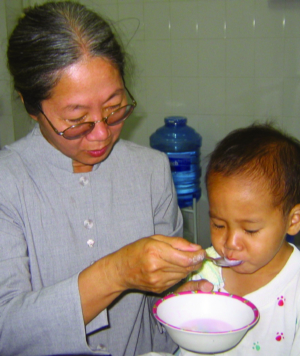Helping Children Take Antiretroviral Medicines on Time
March 2009—A research study of adherence in West Africa asked the caregivers of 74 children who were receiving antiretroviral therapy (ART) whether the children had recently missed any doses of their medicines. Seventy-seven percent of the children, who were around six years old, had lost one parent or both and were being cared for by others. Fiftyseven percent of the caregivers were HIV-positive themselves and half were on ART.

Sister Tue Linh of Mai Hoa AIDS Center, Ho Chi Minh City, giving ART to a child.
|
Overall, 42 percent of the children had perfect adherence and did not miss a dose of ART in the four days or one month prior to the study interview, but adherence for the remaining 58 percent of children was less consistent. The researchers found that a number of factors influenced whether children took their medicines on time, including whether they were receiving certain bitter or difficult to take medicines such as protease inhibitors,1 they were girls, or they lived only with their immediate family and no other relatives. When caregivers found it hard to give the medication, doses were also skipped.
Researchers also asked caregivers what would help them improve the children's adherence. The adults said that financial support and guidance from healthcare providers on how to disclose HIV infection to children would be the most helpful interventions. Once children have been disclosed to, it may be easier for the caregiver to explain the importance of adherence.
This study reminds healthcare providers to offer extra adherence support for families whose children are taking bad-tasting protease inhibitors, large numbers of pills, or spoonfuls of syrup every day. Regarding the finding that girls had more problems taking their medicines on time, it was also noted that they were less likely to have a parent as a caretaker. More parents in this study attended community support groups than other caretakers. Participation in these types of groups can help families cope with social stress and share experiences with ART. Families can also help improve adherence by scheduling medicines around routine daily activities. Doctors and counselors can work with caregivers to find ways to help children take bitter medicines or swallow pills, and discuss new, easier-to-take pills when they become available.
Article: Polisset J, Ametonou F, Arrive E, Aho A, Perez F. Correlates of adherence to antiretroviral therapy in HIV-infected children in Lome´, Togo, West Africa. AIDS and Behavior. 2008 July 25 (epublished here ).
1 Or combinations of zidovudine (AZT), lamivudine (3TC), stavudine (d4T), and abacavir (ABC).